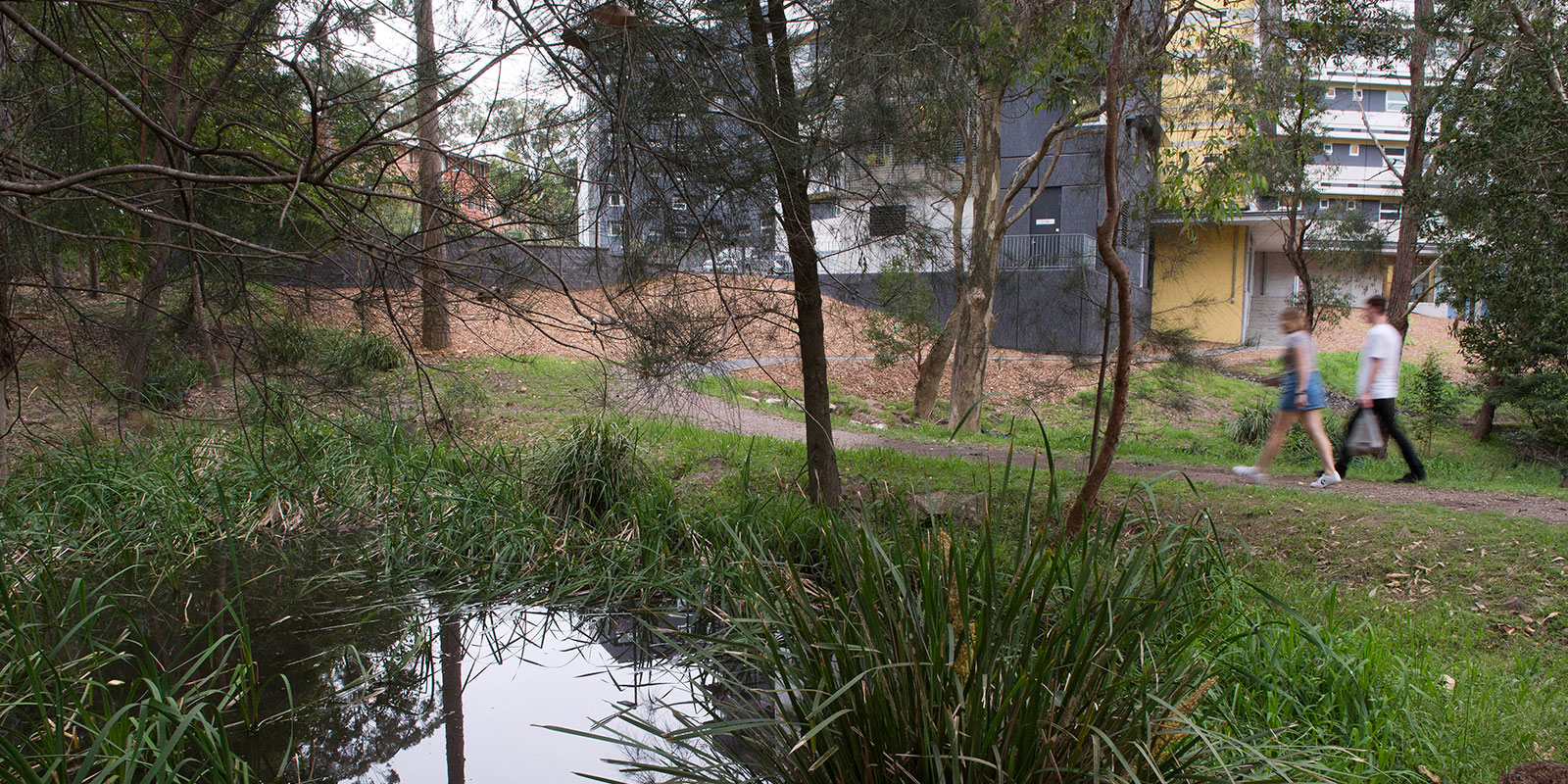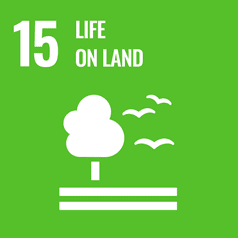

Goal 15:
Life on Land
Sustainable Management of Land for Agriculture
In 2024, the University of Newcastle continued to offer educational programmes and outreach related to sustainable land management for agriculture, particularly in partnership settings in the Pacific and with the Hunter Valley.
Sustainable Management in 2024
- Cook Islands GEF‑7 Project ENUA – Catchment Audits & Community Training
Under the ENUA project, the University is working with the Cook Islands National Environment Service (NES) to conduct water catchment audits on Rarotonga to identify key pollutants impacting catchments.
The University is also delivering training courses in freshwater ecology and water resource management to Cook Islands communities, to help locals monitor the effects of land‑use practices on soil, water, food systems, ecosystem services and biodiversity. - Knowledge, Attitudes, and Practices (KAP) Survey with Local Communities
In mid‑2024, four University of Newcastle students with their supervisor Dr Sascha Fuller travelled to Rarotonga to assist Project ENUA in conducting door‑to‑door surveys (KAP surveys) to establish baseline data regarding community knowledge and practices around agriculture, pollution sources, and environmental conservation. - Leading Global CRC‑High Performance Soils
The University is leading a new Cooperative Research Centre (CRC) for High Performance Soils (CRC‑HPS). This initiative is to develop soil science, farm management practices, big data, sensor technologies, aimed at improving soil health and sustainable agricultural productivity. - CRC for High Performance Soils + Biosolids-to-Biochar Research
In 2024, University researchers secured funding to convert contaminated biosolids into safe nutrient-rich biochar, providing a potentially sustainable soil amendment for agricultural lands, especially where conventional fertilisers are limited or have environmental risks (e.g. PFAS).
This research supports reducing dependence on synthetic fertilisers and improving soil health in agricultural systems. - Food & Agribusiness Roadmap with Applied Research Outreach
The University has published our 2024 Food & Agribusiness Roadmap, aligning our applied research capacity with regional agribusiness and primary producers to deliver environmental sustainability outcomes for agriculture in the Hunter, NSW, and beyond.
This strategic alignment supports collaborative outreach, innovation transfer, and capacity building for sustainable agricultural practices. - UON Community Garden — On‑Campus Demonstration & Engagement
Locally, the University of Newcastle runs a Community Garden (behind the Wollotuka Institute) where staff, students, and community participants come together for planting days, harvesting, working bees, and sustainable gardening practices. The garden uses water tanks, composting, solar pumps, and raised beds to model sustainable land use on a small scale.
This project helps raise awareness of regenerative practices, soil health, native species, and sustainable food production among campus communities. - Institutional Strategy & Engagement Frameworks
While not a pure outreach program, the Strategic Plan’s Engagement Priorities explicitly include supporting “next generation resources for sustainability” and building stronger connections with communities and industry to promote innovative, sustainable land use and resource practices.
Priorities
Engagement priorities
Initiatives
Key initiatives
Living lab model
To advance our four Engagement Priorities, we will implement a Living Lab model to facilitate partner-led problem solving and innovation that stretches beyond the boundaries of our University.
This model will see students, researchers, academics, alumni and industry and community partners coming together to create new knowledge. They will be empowered to experiment with new technologies, craft policy concepts, explore cultural ideas, break new ground in teaching and learning, and embrace a spirit of entrepreneurship to drive commercial innovation.
Multidisciplinary networks
We will establish dedicated networks to drive multidisciplinary collaboration across the four priority areas. These networks will drive our research, innovation and collaboration efforts. They will also identify ways to involve staff and students in the creative problem-solving process and advise on academic needs to ensure we are preparing students for the future of work.
Engagement pathways
We will develop clear pathways that make it easier for businesses, industry and community to connect and collaborate with us. This will result in new partnerships, new research connections, improved entrepreneurship and commercialisation opportunities, and more career-ready placement partners and employers for our students.
Institutional alignment
We will prioritise our strategic investments to support the four Engagement Priorities and drive true multidisciplinary collaboration between faculties, divisions, students, researchers, and our various stakeholders.
Progress

Central Coast twins tackle university to support local mob
Juggling work, study and sport could be challenging for Wiradjuri/Gomeroi twins, Bailey and Leigtham, but there is a clear mission that drives them forward.
Read more

University secures $20.7m innovation facility - a fast track to net zero for industry
Prime Minister Anthony Albanese has today visited the University of Newcastle to announce $20.7 million in funding to develop a ‘Future Industries Facility’ at the university’s Callaghan Campus. It will bring together undergraduate students, SMEs and community from across the Hunter to test and scale-up new technology and upskill people.
Read more

Ngarrama returns to light up Newcastle
Ngarrama will illuminate King Edward Park on Saturday 25 January when the University of Newcastle proudly welcomes the community back for its annual reflection event.
Read more

Further international success for public health pioneer
Professor Xiaofei Zhang, a highly accomplished health professional and alumnus of the University of Newcastle, has been awarded the Life Science Award at the 2024 Australia China Alumni Awards (ACAA).
Read more

University of Newcastle recognised as national leader in equity
The University of Newcastle has today been recognised as a leader in addressing inequality, becoming one of the first two universities in Australia to receive a Science in Australia Gender Equity (SAGE) Athena Swan Silver Award.
Read more

Matilda masters expanding her health career
After working in infectious disease during the COVID-19 pandemic, Matilda Boey knew she wanted to contribute further to Singapore’s health system, inspiring her to study a Master of Public Health.
Read more
Goals
Our
2025
goals
Excellence
We will see continued growth in our performance in independent external rankings for teaching and research excellence.
Equity
We will continually increase the number of students and staff participating in multidisciplinary collaboration, workplace learning, and professional development.
Engagement
We will grow partner-led multidisciplinary collaborations designed to deliver real-world outcomes, impact and scalability that increase research income and career-ready placement opportunities for students.
Sustainability
We will adopt innovative teaching, research and engagement models that not only support the future of our regions but also drive positive change nationally and globally.
The University of Newcastle acknowledges the traditional custodians of the lands within our footprint areas: Awabakal, Darkinjung, Biripai, Worimi, Wonnarua, and Eora Nations. We also pay respect to the wisdom of our Elders past and present.